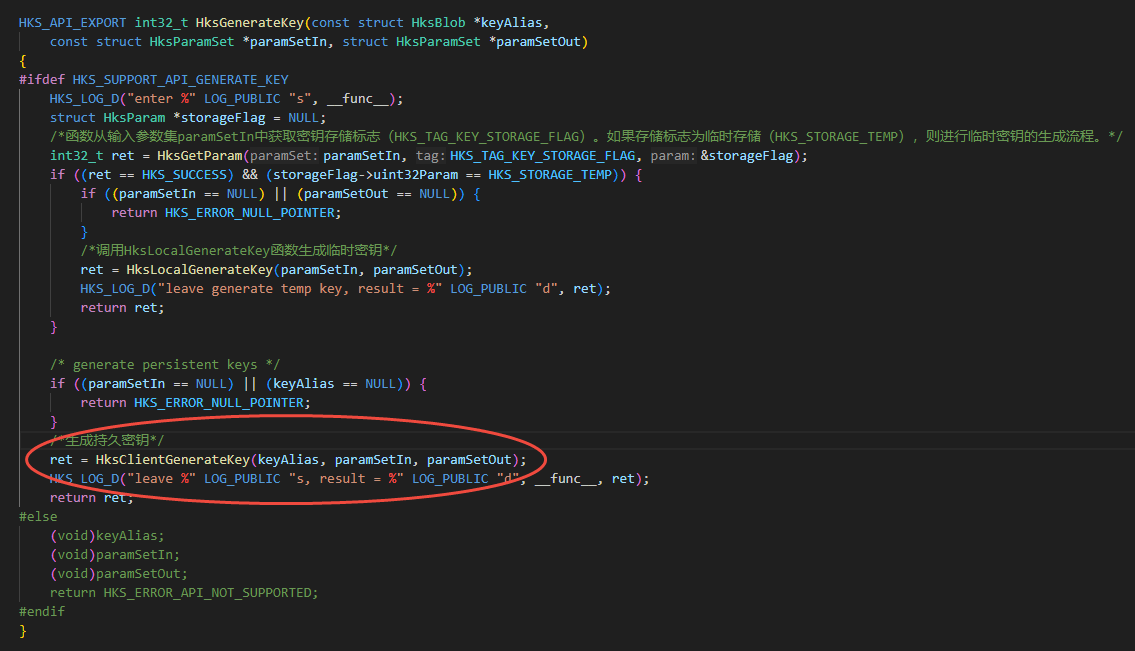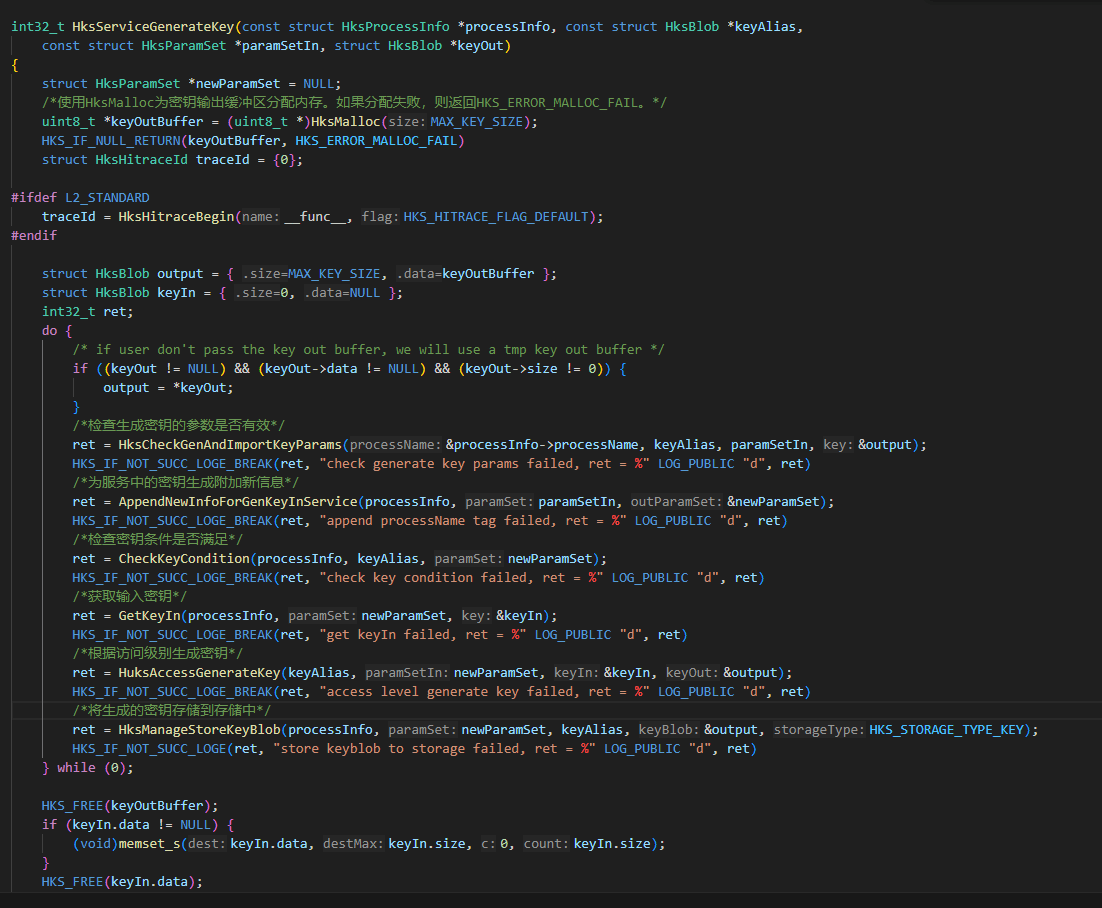openharmony安全子系统之密钥管理服务(Universal Keystore,下述简称为HUKS)
Universal Keystore Kit(密钥管理服务,下述简称为HUKS)向业务/应用提供各类密钥的统一安全操作能力,包括密钥管理(密钥生成/销毁、密钥导入、密钥证明、密钥协商、密钥派生)及密钥使用(加密/解密、签名/验签、访问控制)等功能。 生成密钥(C/C++)
Universal Keystore Kit(密钥管理服务,下述简称为HUKS)向业务/应用提供各类密钥的统一安全操作能力,包括密钥管理(密钥生成/销毁、密钥导入、密钥证明、密钥协商、密钥派生)及密钥使用(加密/解密、签名/验签、访问控制)等功能。
生成密钥(C/C++)
以生成ECC密钥为例,生成随机密钥。具体的场景介绍及支持的算法规格,请参考密钥生成支持的算法。
注意: 密钥别名中禁止包含个人数据等敏感信息。
在CMake脚本中链接相关动态库: target_link_libraries(entry PUBLIC libhuks_ndk.z.so)
开发步骤
1、指定待生成的密钥别名keyAlias。
密钥别名的最大长度为64字节。
对于不同业务间生成的密钥,HUKS将基于业务身份信息进行存储路径隔离,不会因为和其他业务密钥同名导致冲突。
2、初始化密钥属性集。通过OH_Huks_InitParamSet、OH_Huks_AddParams、OH_Huks_BuildParamSet构造密钥属性集paramSet。 密钥属性集中必须包
OH_Huks_KeyAlg、OH_Huks_KeySize、OH_Huks_KeyPurpose属性。注:一个密钥只能有一类PURPOSE,并且,生成密钥时指定的用途要与使用时的方式一致,否
会导致异常,请参考密钥用途
3、调用OH_Huks_GenerateKeyItem,传入密钥别名和密钥属性集,生成密钥。
说明: 如果业务再次使用相同别名调用HUKS生成密钥,HUKS将生成新密钥并直接覆盖历史的密钥文件。
示例代码如下
/* 以下以生成ECC密钥为例 */
#include "huks/native_huks_api.h"
#include "huks/native_huks_param.h"
#include <string.h>
OH_Huks_Result InitParamSet(
struct OH_Huks_ParamSet **paramSet,
const struct OH_Huks_Param *params,
uint32_t paramCount)
{
OH_Huks_Result ret = OH_Huks_InitParamSet(paramSet);
if (ret.errorCode != OH_HUKS_SUCCESS) {
return ret;
}
ret = OH_Huks_AddParams(*paramSet, params, paramCount);
if (ret.errorCode != OH_HUKS_SUCCESS) {
OH_Huks_FreeParamSet(paramSet);
return ret;
}
ret = OH_Huks_BuildParamSet(paramSet);
if (ret.errorCode != OH_HUKS_SUCCESS) {
OH_Huks_FreeParamSet(paramSet);
return ret;
}
return ret;
}
struct OH_Huks_Param g_testGenerateKeyParam[] = {
{
.tag = OH_HUKS_TAG_ALGORITHM,
.uint32Param = OH_HUKS_ALG_ECC
}, {
.tag = OH_HUKS_TAG_PURPOSE,
.uint32Param = OH_HUKS_KEY_PURPOSE_AGREE
}, {
.tag = OH_HUKS_TAG_KEY_SIZE,
.uint32Param = OH_HUKS_ECC_KEY_SIZE_256
}, {
.tag = OH_HUKS_TAG_DIGEST,
.uint32Param = OH_HUKS_DIGEST_NONE
}
};
static napi_value GenerateKey(napi_env env, napi_callback_info info)
{
/* 1.确定密钥别名 */
const char *alias = "test_generate";
struct OH_Huks_Blob aliasBlob = { .size = (uint32_t)strlen(alias), .data = (uint8_t *)alias };
struct OH_Huks_ParamSet *testGenerateKeyParamSet = nullptr;
struct OH_Huks_Result ohResult;
do {
/* 2.初始化密钥属性集 */
ohResult = InitParamSet(&testGenerateKeyParamSet, g_testGenerateKeyParam,
sizeof(g_testGenerateKeyParam) / sizeof(OH_Huks_Param));
if (ohResult.errorCode != OH_HUKS_SUCCESS) {
break;
}
/* 3.生成密钥 */
ohResult = OH_Huks_GenerateKeyItem(&aliasBlob, testGenerateKeyParamSet, nullptr);
} while (0);
OH_Huks_FreeParamSet(&testGenerateKeyParamSet);
napi_value ret;
napi_create_int32(env, ohResult.errorCode, &ret);
return ret;
}分析关键函数OH_Huks_GenerateKeyItem,路径base/security/huks/interfaces/kits/c/src/native_huks_api.c

分析关键函数HksGenerateKey,详细说明看注释,路径base/security/huks/interfaces/inner_api/huks_standard/main/src/hks_api.c

分析关键函数HksClientGenerateKey,详细说明看注释,路径:base/security/huks/frameworks/huks_standard/main/os_dependency/ipc/src/hks_client_service_passthrough.c

分析关键函数HksServiceGenerateKey,路径:base/security/huks/services/huks_standard/huks_service/main/core/src/hks_client_service.c

加解密(C/C++)
以AES 256密钥为例,完成加解密。具体的场景介绍及支持的算法规格,请参考密钥生成支持的算法。
在CMake脚本中链接相关动态库:target_link_libraries(entry PUBLIC libhuks_ndk.z.so)
开发步骤
1、生成密钥
指定密钥别名。
初始化密钥属性集。
调用OH_Huks_GenerateKeyItem生成密钥,具体请参考密钥生成。
除此之外,开发者也可以参考密钥导入,导入已有的密钥。
2、加密
获取密钥别名。
获取待加密的数据。
调用OH_Huks_InitParamSet指定算法参数配置。 在下方示例中,使用算法AES进行加密时,必须要选择其对应分组模式以及填充模式,用例中选取的分组模式为CBC、填充模式为PKCS7,此时必须要填参数IV。
调用OH_Huks_InitSession初始化密钥会话,并获取会话的句柄handle。
调用OH_Huks_FinishSession结束密钥会话,获取加密后的密文。
3、解密
获取密钥别名。
获取待解密的密文。
调用OH_Huks_InitParamSet指定算法参数配置。 在下方示例中,使用算法AES进行解密时,必须要选择其对应分组模式以及填充模式,用例中选取的分组模式为CBC、填充模式为PKCS7,此时必须要填参数IV。
调用OH_Huks_InitSession初始化密钥会话,并获取会话的句柄handle。
调用OH_Huks_FinishSession结束密钥会话,获取解密后的数据。
4、删除密钥
当密钥废弃不用时,需要调用OH_Huks_DeleteKeyItem删除密钥,具体请参考密钥删除。
示例代码如下:
#include "huks/native_huks_api.h"
#include "huks/native_huks_param.h"
#include <string.h>
OH_Huks_Result InitParamSet(
struct OH_Huks_ParamSet **paramSet,
const struct OH_Huks_Param *params,
uint32_t paramCount)
{
OH_Huks_Result ret = OH_Huks_InitParamSet(paramSet);
if (ret.errorCode != OH_HUKS_SUCCESS) {
return ret;
}
ret = OH_Huks_AddParams(*paramSet, params, paramCount);
if (ret.errorCode != OH_HUKS_SUCCESS) {
OH_Huks_FreeParamSet(paramSet);
return ret;
}
ret = OH_Huks_BuildParamSet(paramSet);
if (ret.errorCode != OH_HUKS_SUCCESS) {
OH_Huks_FreeParamSet(paramSet);
return ret;
}
return ret;
}
static const uint32_t IV_SIZE = 16;
static uint8_t IV[IV_SIZE] = { 0 }; // this is a test value, for real use the iv should be different every time
static struct OH_Huks_Param g_genEncDecParams[] = {
{
.tag = OH_HUKS_TAG_ALGORITHM,
.uint32Param = OH_HUKS_ALG_AES
}, {
.tag = OH_HUKS_TAG_PURPOSE,
.uint32Param = OH_HUKS_KEY_PURPOSE_ENCRYPT | OH_HUKS_KEY_PURPOSE_DECRYPT
}, {
.tag = OH_HUKS_TAG_KEY_SIZE,
.uint32Param = OH_HUKS_AES_KEY_SIZE_256
}, {
.tag = OH_HUKS_TAG_PADDING,
.uint32Param = OH_HUKS_PADDING_NONE
}, {
.tag = OH_HUKS_TAG_BLOCK_MODE,
.uint32Param = OH_HUKS_MODE_CBC
}
};
static struct OH_Huks_Param g_encryptParams[] = {
{
.tag = OH_HUKS_TAG_ALGORITHM,
.uint32Param = OH_HUKS_ALG_AES
}, {
.tag = OH_HUKS_TAG_PURPOSE,
.uint32Param = OH_HUKS_KEY_PURPOSE_ENCRYPT
}, {
.tag = OH_HUKS_TAG_KEY_SIZE,
.uint32Param = OH_HUKS_AES_KEY_SIZE_256
}, {
.tag = OH_HUKS_TAG_PADDING,
.uint32Param = OH_HUKS_PADDING_NONE
}, {
.tag = OH_HUKS_TAG_BLOCK_MODE,
.uint32Param = OH_HUKS_MODE_CBC
}, {
.tag = OH_HUKS_TAG_IV,
.blob = {
.size = IV_SIZE,
.data = (uint8_t *)IV // this is a test value, for real use the iv should be different every time
}
}
};
static struct OH_Huks_Param g_decryptParams[] = {
{
.tag = OH_HUKS_TAG_ALGORITHM,
.uint32Param = OH_HUKS_ALG_AES
}, {
.tag = OH_HUKS_TAG_PURPOSE,
.uint32Param = OH_HUKS_KEY_PURPOSE_DECRYPT
}, {
.tag = OH_HUKS_TAG_KEY_SIZE,
.uint32Param = OH_HUKS_AES_KEY_SIZE_256
}, {
.tag = OH_HUKS_TAG_PADDING,
.uint32Param = OH_HUKS_PADDING_NONE
}, {
.tag = OH_HUKS_TAG_BLOCK_MODE,
.uint32Param = OH_HUKS_MODE_CBC
}, {
.tag = OH_HUKS_TAG_IV,
.blob = {
.size = IV_SIZE,
.data = (uint8_t *)IV // this is a test value, for real use the iv should be different every time
}
}
};
static const uint32_t AES_COMMON_SIZE = 1024;
OH_Huks_Result HksAesCipherTestEncrypt(
const struct OH_Huks_Blob *keyAlias,
const struct OH_Huks_ParamSet *encryptParamSet, const struct OH_Huks_Blob *inData, struct OH_Huks_Blob *cipherText)
{
uint8_t handleE[sizeof(uint64_t)] = {0};
struct OH_Huks_Blob handleEncrypt = {sizeof(uint64_t), handleE};
OH_Huks_Result ret = OH_Huks_InitSession(keyAlias, encryptParamSet, &handleEncrypt, nullptr);
if (ret.errorCode != OH_HUKS_SUCCESS) {
return ret;
}
ret = OH_Huks_FinishSession(&handleEncrypt, encryptParamSet, inData, cipherText);
return ret;
}
OH_Huks_Result HksAesCipherTestDecrypt(
const struct OH_Huks_Blob *keyAlias,
const struct OH_Huks_ParamSet *decryptParamSet, const struct OH_Huks_Blob *cipherText, struct OH_Huks_Blob *plainText,
const struct OH_Huks_Blob *inData)
{
uint8_t handleD[sizeof(uint64_t)] = {0};
struct OH_Huks_Blob handleDecrypt = {sizeof(uint64_t), handleD};
OH_Huks_Result ret = OH_Huks_InitSession(keyAlias, decryptParamSet, &handleDecrypt, nullptr);
if (ret.errorCode != OH_HUKS_SUCCESS) {
return ret;
}
ret = OH_Huks_FinishSession(&handleDecrypt, decryptParamSet, cipherText, plainText);
return ret;
}
static napi_value EncDecKey(napi_env env, napi_callback_info info)
{
char tmpKeyAlias[] = "test_enc_dec";
struct OH_Huks_Blob keyAlias = { (uint32_t)strlen(tmpKeyAlias), (uint8_t *)tmpKeyAlias };
struct OH_Huks_ParamSet *genParamSet = nullptr;
struct OH_Huks_ParamSet *encryptParamSet = nullptr;
struct OH_Huks_ParamSet *decryptParamSet = nullptr;
OH_Huks_Result ohResult;
do {
/* 1. Generate Key */
/*
* 模拟生成密钥场景
* 1.1. 确定密钥别名
*/
/*
* 1.2. 获取生成密钥算法参数配置
*/
ohResult = InitParamSet(&genParamSet, g_genEncDecParams, sizeof(g_genEncDecParams) / sizeof(OH_Huks_Param));
if (ohResult.errorCode != OH_HUKS_SUCCESS) {
break;
}
/*
* 1.3. 调用generateKeyItem
*/
ohResult = OH_Huks_GenerateKeyItem(&keyAlias, genParamSet, nullptr);
if (ohResult.errorCode != OH_HUKS_SUCCESS) {
break;
}
/* 2. Encrypt */
/*
* 模拟加密场景
* 2.1. 获取密钥别名
*/
/*
* 2.2. 获取待加密的数据
*/
/*
* 2.3. 获取加密算法参数配置
*/
ohResult = InitParamSet(&encryptParamSet, g_encryptParams, sizeof(g_encryptParams) / sizeof(OH_Huks_Param));
if (ohResult.errorCode != OH_HUKS_SUCCESS) {
break;
}
char tmpInData[] = "AES_ECB_INDATA_1";
struct OH_Huks_Blob inData = { (uint32_t)strlen(tmpInData), (uint8_t *)tmpInData };
uint8_t cipher[AES_COMMON_SIZE] = {0};
struct OH_Huks_Blob cipherText = {AES_COMMON_SIZE, cipher};
/*
* 2.4. 调用initSession获取handle
*/
/*
* 2.5. 调用finishSession获取加密后的密文
*/
ohResult = HksAesCipherTestEncrypt(&keyAlias, encryptParamSet, &inData, &cipherText);
if (ohResult.errorCode != OH_HUKS_SUCCESS) {
break;
}
/* 3. Decrypt */
/*
* 模拟解密场景
* 3.1. 获取密钥别名
*/
/*
* 3.2. 获取待解密的密文
*/
/*
* 3.3. 获取解密算法参数配置
*/
ohResult = InitParamSet(&decryptParamSet, g_decryptParams, sizeof(g_decryptParams) / sizeof(OH_Huks_Param));
if (ohResult.errorCode != OH_HUKS_SUCCESS) {
break;
}
uint8_t plain[AES_COMMON_SIZE] = {0};
struct OH_Huks_Blob plainText = {AES_COMMON_SIZE, plain};
/*
* 3.4. 调用initSession获取handle
*/
/*
* 3.5. 调用finishSession获取解密后的数据
*/
ohResult = HksAesCipherTestDecrypt(&keyAlias, decryptParamSet, &cipherText, &plainText, &inData);
} while (0);
/* 4. Delete Key */
/*
* 模拟删除密钥场景
* 4.1. 获取密钥别名
*/
/*
* 4.2. 调用deleteKeyItem删除密钥
*/
(void)OH_Huks_DeleteKeyItem(&keyAlias, genParamSet);
OH_Huks_FreeParamSet(&genParamSet);
OH_Huks_FreeParamSet(&encryptParamSet);
OH_Huks_FreeParamSet(&decryptParamSet);
napi_value ret;
napi_create_int32(env, ohResult.errorCode, &ret);
return ret;
}
里面所使用的API可以根据我上面解析OH_Huks_GenerateKeyItem一样,进行代码分析。
更多推荐
 已为社区贡献7条内容
已为社区贡献7条内容






所有评论(0)